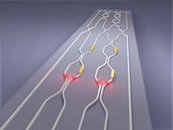qubit
Overclocked quantum bit
- Joined
- Dec 6, 2007
- Messages
- 17,865 (2.86/day)
- Location
- Quantum Well UK
| System Name | Quantumville™ |
|---|---|
| Processor | Intel Core i7-2700K @ 4GHz |
| Motherboard | Asus P8Z68-V PRO/GEN3 |
| Cooling | Noctua NH-D14 |
| Memory | 16GB (2 x 8GB Corsair Vengeance Black DDR3 PC3-12800 C9 1600MHz) |
| Video Card(s) | MSI RTX 2080 SUPER Gaming X Trio |
| Storage | Samsung 850 Pro 256GB | WD Black 4TB | WD Blue 6TB |
| Display(s) | ASUS ROG Strix XG27UQR (4K, 144Hz, G-SYNC compatible) | Asus MG28UQ (4K, 60Hz, FreeSync compatible) |
| Case | Cooler Master HAF 922 |
| Audio Device(s) | Creative Sound Blaster X-Fi Fatal1ty PCIe |
| Power Supply | Corsair AX1600i |
| Mouse | Microsoft Intellimouse Pro - Black Shadow |
| Keyboard | Yes |
| Software | Windows 10 Pro 64-bit |
Quantum photonic chips: these featured in the University of Bristol's press release today and sound like something out of Star Trek. So, what's so fantastic about them? This can best be explained by analogy with the transition from valves to transistors ie when electronic circuits went "solid state" in the 1960's, bringing huge advances in miniaturization and functionality. Current quantum experiments involve heavy and bulky equipment that can fill up a lab, uses lots of power, operates at close to absolute zero degrees kelvin and usually involve multiple lasers somewhere along the line. However, these photonic chips are just that, tiny solid state pieces of silicon that can store and manipulate qubits, the quantum equivalent of the bit. On top of that, they can be stacked together, to make complex digital circuits which can be reconfigured for various general purpose tasks.

This picture above shown in the press release, comes with the following explanation on the university's website: "Artist's impression of the quantum photonic chip, showing the waveguide circuit (in white), and the voltage-controlled phase shifters (metal contacts on the surface). Photon pairs become entangled as they pass through the circuit. Image by University of Bristol's Centre for Quantum Photonics."
There's a bit more information about this research in the press release and we would like to talk in considerably more detail about it, but unfortunately, it's locked up behind a $32 paywall. From the looks of the picture in the press release, the equipment is still quite bulky however and likely still works at low temperatures. However, it's still a big advance on what we've had so far and this miniaturization might well be the key that finally unlocks the door to widespread use of quantum computers in something considerably less than a lifetime away. So, from a PC and gaming enthusiast's viewpoint, of great interest are the advances in realism that this technology brings to games. Will we finally be immersed in 3D photorealistic environments with artificial intelligence indistinguishable from that of a human? That would be truly amazing and is something worth waiting for.
Regardless of when the advancements come, TechPowerUp will be there to report on them. Watch this space.
View at TechPowerUp Main Site

This picture above shown in the press release, comes with the following explanation on the university's website: "Artist's impression of the quantum photonic chip, showing the waveguide circuit (in white), and the voltage-controlled phase shifters (metal contacts on the surface). Photon pairs become entangled as they pass through the circuit. Image by University of Bristol's Centre for Quantum Photonics."
There's a bit more information about this research in the press release and we would like to talk in considerably more detail about it, but unfortunately, it's locked up behind a $32 paywall. From the looks of the picture in the press release, the equipment is still quite bulky however and likely still works at low temperatures. However, it's still a big advance on what we've had so far and this miniaturization might well be the key that finally unlocks the door to widespread use of quantum computers in something considerably less than a lifetime away. So, from a PC and gaming enthusiast's viewpoint, of great interest are the advances in realism that this technology brings to games. Will we finally be immersed in 3D photorealistic environments with artificial intelligence indistinguishable from that of a human? That would be truly amazing and is something worth waiting for.
Regardless of when the advancements come, TechPowerUp will be there to report on them. Watch this space.
View at TechPowerUp Main Site





